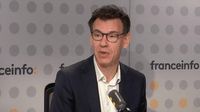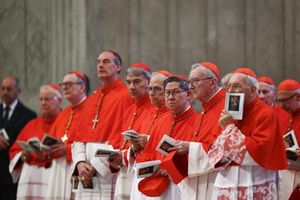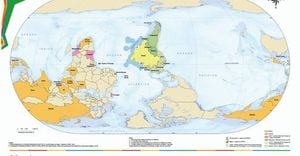In a bold move to attract global scientific talent, French President Emmanuel Macron has officially invited researchers from around the world to come work in France and other parts of Europe. This initiative comes in response to significant funding cuts for universities and research centers in the United States, a situation exacerbated by the Trump administration's recent policies.
On April 18, 2025, Macron launched the "Choose France for Science" platform, which is operated by the French National Research Agency (ANR). This new initiative aims to provide co-funding opportunities for universities, schools, and research organizations looking to host international researchers. The platform is set to officially open for applications on May 5, 2025, just a few weeks away.
"Here in France, research is a priority, innovation a culture, science a limitless horizon. Researchers from all over the world, choose France, choose Europe!" Macron stated in a post on X, formerly known as Twitter. His call to action is particularly poignant given the current climate in U.S. academia, where hundreds of scientists have faced job losses due to budget cuts.
Macron's invitation comes as the Trump administration has implemented severe funding reductions for various academic programs, with officials citing the wave of pro-Palestinian protests on campuses last year as justification for their actions. Critics, however, argue that these measures are designed to suppress free speech and academic freedom. Many faculty and student groups have voiced concerns, asserting that universities should remain bastions of free expression and intellectual inquiry.
Philippe Baptiste, France's Minister of Higher Education and Research, echoed Macron's sentiments on April 19, stating that France can accommodate "hundreds" of researchers. He emphasized that this effort to welcome scientists is not just a national initiative but requires collective action at the European level. Baptiste noted that bringing a highly qualified researcher along with their team to France could cost around one million euros over three years, a significant investment that could total hundreds of millions if multiple researchers are welcomed.
"It's a collective effort, and I think the right effort should be made at the European level," Baptiste explained. He also highlighted the importance of the upcoming meeting on May 5, where European leaders in research and science will convene in Paris to discuss the decline of academic freedoms seen in many parts of the world.
"The president has planned to gather the European research community to address the rollback of academic liberties that we are witnessing globally," Baptiste added. He stressed that Europe must take pride in its commitment to research and science, emphasizing the values of excellence and engagement in these fields.
As the Trump administration continues to implement budget cuts, Baptiste did not hold back in his criticism, describing the situation as "a massacre of budgets". He pointed out that cuts to major institutions like the National Institutes of Health (NIH) and the National Oceanic and Atmospheric Administration (NOAA) have far-reaching implications, not only for the U.S. but also for international collaborations that are critical for global research efforts.
"When we cut the budgets of the NIH by 40% or eliminate the NOAA, these are agencies that have extraordinarily strong ties with us Europeans, and behind them are international programs that are profoundly weakened," he stated.
The "Choose France for Science" initiative is seen as a strategic move to position France as a leading destination for researchers fleeing the restrictive academic environment in the U.S. Aix Marseille University has already reported a surge of interest in its "Safe Place for Science" program, which aims to provide refuge for scientists impacted by funding cuts. The university announced in March 2025 that it would welcome U.S. researchers, and the first of these scientists are expected to start their work in France by June 2025.
This initiative is not only about attracting talent but also about fostering a robust research community that thrives on collaboration and innovation. The French government is keen to demonstrate its commitment to academic freedom and the pursuit of knowledge, especially in fields like health research, climate and biodiversity, artificial intelligence, space studies, agriculture, low-carbon energy, and digital systems.
As the May 5 meeting approaches, the anticipation is building within the scientific community. The gathering promises to be a pivotal moment for European research, highlighting the continent's dedication to maintaining a vibrant academic environment in the face of global challenges.
In summary, Macron's call to international researchers is more than just a recruitment drive; it represents a broader commitment to uphold academic freedoms and foster a collaborative research ecosystem in Europe. With the backdrop of U.S. funding cuts and political turmoil, France aims to emerge as a beacon of hope for scientists seeking a supportive environment to continue their work.





